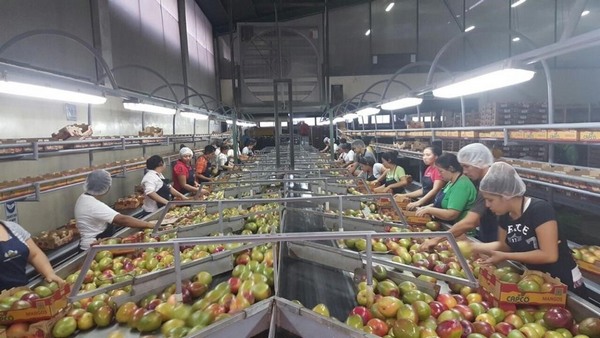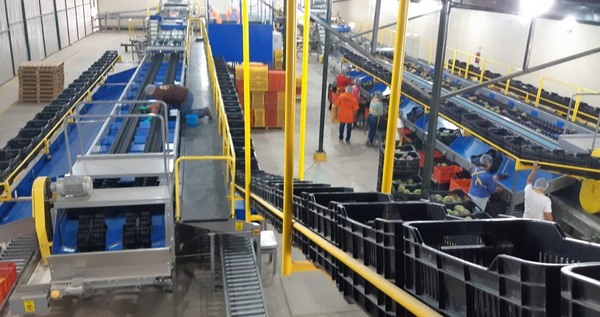Over 500 mango varieties are cultivated around the world. European and North American consumers have two, quite different, favourites. European consumers prefer the Keitt variety – greener, fibreless and with a tangy, sweet taste. In the USA, Tommy Atkins mangoes top the list. This variety is more colourful, mildly sweet and higher in fibre. Guatemala-based Amadeo Export offers both, and at a unique time of the year: from March to May.
Satisfying consumer cravings
Over the years, Europeans have acquired quite a taste for the mangoes. But getting Central American mangoes to European consumers in a perfectly ripened condition is no mean feat. Amadeo Export has its own production farms and additionally works with over 100 local farmers in Guatemala, overseeing the entire value chain, from planting to shipping. Commercial Manager Katy Stefani details: "We handle the fruit with extreme care, and we make sure the cold chain isn’t broken during shipping. This way, the fruit arrives in excellent condition and with many days of shelf life left."

Filling the gap from March to May
Short harvest periods and differences in climate zones mean that not one single country or mango variety can offer a long supply season. As the warm weather moves up the American continent, each country has a certain window of time during which its fruit is ready for export. Guatemala is situated right in between Peru and Mexico, offering mangoes at a time of year when no other country can: "You can’t control when mangoes are ready," Stefani explains. "It all depends on the cold weather, which for us is in November. This is to our advantage, because it means our fruit is ready to pick between March and May, and we can fill in the gap between other mango-exporting countries."
Another benefit of the climate zone in which Amadeo Export is based is that it is ideal for both Keitt and Tommy Atkins varieties. "Our area, Zacapa, has a very arid microclimate. Each plantation has their own irrigation system in place and mango is one of the few crops that thrive here," Stefani says. "The climate makes our fruit juicy and flavourful, and the dryness also means less chance of fungi, so a longer shelf life."

Growing trees and the business
Amadeo Export started targeting the European market six years ago and it has been a long journey. After all, Keitt mango trees don’t grow in a day. But this year, Stefani and his team started exporting the new variety, and they expect a 20% increase in the firm’s export capacity over the next couple of years. "Targeting the EU was the right decision," Stefani says. "Getting there has been our greatest success in the last few years. And, importantly, we didn’t have to sacrifice any of our company values to achieve it. If anything, our quality has improved, and we are able to have an even bigger impact on our community than we had before."
Aside from planting the new variety, the company has qualified for GLOBALG.A.P, SMETA and GFS certifications. They also joined CBI’s Connecting Central America programme in 2018. This helped them to prepare effectively for the demanding European market and to connect with the right buyers.

Resilient and future-proof
Amadeo Export has faced its challenges in becoming a European supplier. When the COVID-19 pandemic broke out at the beginning of the year, the market stopped for three weeks, Stefani recalls. "40% of our fruit stayed in the country, and by the time we were able to start up again, our export window was closing."
Then, in November, tropical storm Eta flooded Guatemala’s fields: the damage is still being assessed. Through all of this, Stefani and his colleagues remain as undaunted as they are successful. "Growing fruit is not about luck. It is about looking ahead and being prepared,’ he says. ‘We’ve learned to look beyond temporary challenges, because we’re here to build something resilient and future-proof: with more trees, better processes, and good relationships with buyers."

Hope for future generations
In a climate zone so hostile to so many crops, the success of Amadeo Export’s mangoes has a huge impact on the local community. The company collaborates with over 100 local farmers and hires over 750 workers during picking season. "It's exciting to see how people’s mentality is changing," Stefani reflects. "Our partners trust us and are hopeful for the future. They see that there is enough work and that together we are building something for the next generations."
Learn more about Amadeo Exports and other reliable Central American suppliers in the Connecting Central America brochure, or get to know them personally by requesting a virtual B2B meeting through the event page. You can also get in touch or find out more via the Amadeo Export website or their Facebook page.

Amadeo Export is being promoted by the Centre for the Promotion of Imports from developing countries (CBI) as a part of CBI’s Connecting Central America initiative. This initiative is co-financed by the European Union and coordinated by the Secretariat for Central American Economic Integration (SIECA).
For more information:
Katy Stefani
Amadeo Export
Tel: +502 3003 0065
Email: katy@altobasogroup.net
www.amadeoexport.com
Arno van der Maden
Email: arno@nsdeltropico.com
Tel: +506 884 74 746
